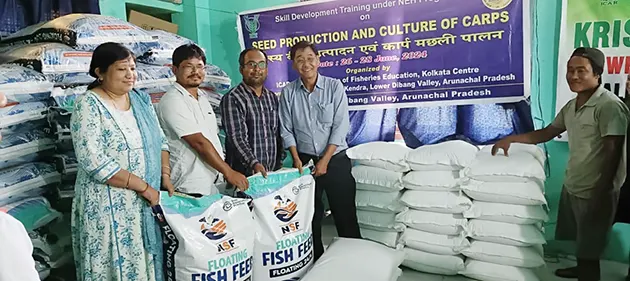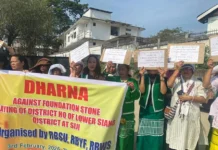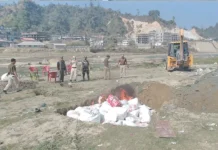ROING, 28 Jun: Carp fish seed production using a portable hatchery was successfully done for the first time in Lower Dibang Valley (LDV) district during a three-day hands-on training-cum-demonstration programme on fish seed production and culture of carps, organised by the Balek-based LDV KVK at Rukmo village in the district.
The portable fish hatchery was used for imparting hands-on training on induced breeding of carps, hatchery operation, and seed production and culture to the fish farmers during the training, which concluded on Friday.
During the demonstration of breeding of Indian major carp rohu, around 8 lakh spawn was produced using the portable hatchery.
This initiative makes LDV district self-reliant in carp seed production, and will meet the seed demand of over 250 farmers of the district.
Participating in the training, progressive farmer Oling Modi commended the activities of Mumbai (Maharashtra)-based Central Institute of Fisheries Education (CIFE) for the welfare of the farming community. Modi urged the farmers to adopt scientific fish farming practices to enhance productivity and improve their livelihood.
The CIFE’s Kolkata (WB) centre’s principal scientist Dr G Biswas imparted training in composite fish culture, and breeding and hatchery management of fish. He presented a practical demonstration on the induced breeding technique for the benefit of the farmers.
He recommended “use of quality, uniform and bigger-size fish seeds in multiple stocking and multiple harvesting farming systems to increase the fish productivity.”
Biswas said that “the successful hatchery model can be propagated at various places of the state for the benefit of farmers.”
CIFE Kolkata centre scientist Dr Dilip Kumar Singh spoke on design and construction of fish hatchery, nursery management, brood stock and larval nutrition, and the importance of farm-made aqua feed utilising locally available cheap feed ingredients to reduce the feed cost.
KVK Head Dr Deepanjali Deori said that the training programme and hatchery would immensely benefit fish farmers “and meet the fish seed demand to improve their livelihood by adopting modern methods of aquaculture.”
Fishery expert Jimmy Mize presented a brief on the various activities and services of the KVK for the benefit of farmers.
Farmer group leader Okili Linggi, who is also a hatchery operator in Rukmo village, shared his happiness over the establishment and initiation of the operation of the hatchery at his farm, saying that it would “help in meeting the fish seed requirement in the area and increase the fish production of the district and the state.”
With the aim of meeting the local fish seed demand, an FRP made carp eco-hatchery, with a holding capacity for 25 kg brood fish and one million fish seed production per cycle, was established in Rukmo village by the Kolkata Centre of the CIFE, with the assistance of the KVK.
A total of 20 fish farmers participated in the training and received critical inputs on fish farming, such as lime, fish feed and study materials, from the organisers. (DIPRO)




